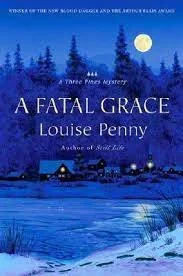My wife is rereading the second book in the series to prepare for Louise Penny's upcoming novel in which she apparently alludes to things in the earlier books. One of the great things about marriage is having someone to share gold nuggets with when they are discovered. My wife shared this nugget with me this morning, which resonates with me as someone who is consistently burdened by the polarization of our culture.
Love Thy Other
In his book Cultural Intelligence (a phrase I happen to use quite a bit), David Livermore says the "first step toward becoming culturally intelligent is to become more aware of our own cultural identity." The last few weeks have shown me -- and us -- that we in the US don't know ourselves as well as we thought we did. It seems there were surprises at every turn during the (interminable) election season. My Friday morning breakfast buddy, David, and I would look at each other months ago and assure each other there was no way Trump would be elected. Yet here we are.
The events and conversations surrounding this election, as well as other historic events such as Black Lives Matter, have had a way of revealing -- not creating -- some real gaps in understanding the Other, whoever that may be. Like a personal trial uncovers traits in us we may not have even been aware of, the same thing seems to be happening on a national scale.
One not-so-attractive trait I've discovered in myself is a tendency to paint people with too broad a brush. The truth is not all Trump voters are the same or voted for him for the same reasons, and the very same can be said of Clinton supporters. And all of these people are so much more than Trump or Clinton supporters. One of the toxic byproducts of this election cycle is the tendency to divide the country into those two camps -- as if we had no other way to define ourselves.
One thing Livermore says in his chapter entitled "The Average American" hit close to home:
"I've been gently challenged by friends in other parts of the world about my tendency to treat my fellow Americans with the same kind of paternalistic arrogance that I accuse them of using with others. One Asian friend said, 'But, Dave [bringing it even closer to home], might it be that the very things you accuse your fellow citizens of doing in relationship to people from other cultures is the way you're relating to them? Maybe the Other for you is a less-traveled, less-thoughtful American neighbor!'" (Bold print mine.)
Ouch.
So I took David Brooks' advice and read, with my wife, J.D. Vance's book Hillbilly Elegy, which I will review in a forthcoming post. Suffice it to say for now that it is a poignant and in some ways tragic depiction of a demographic that I am still trying to understand. (Do not understand me to imply that all Trump supporters are hillbillies; if you do, you're missing the point here.) I have to confess that I often feel I relate better to people from any number of foreign countries than I do to this subculture in which Vance grew up in Eastern Kentucky and Western Ohio and unapologetically calls "hillbilly".
Livermore reminds us that self-awareness is the starting place. Once we become more aware of what drives our own assumptions and values, we can begin to contrast these with those of the Other. And if you're anything like me -- and I know I am -- you have more than one Other to seek to understand.
I suppose Socrates had it right when he said, "Above all, know thyself."
Probably the best way to "Love thy Other."


